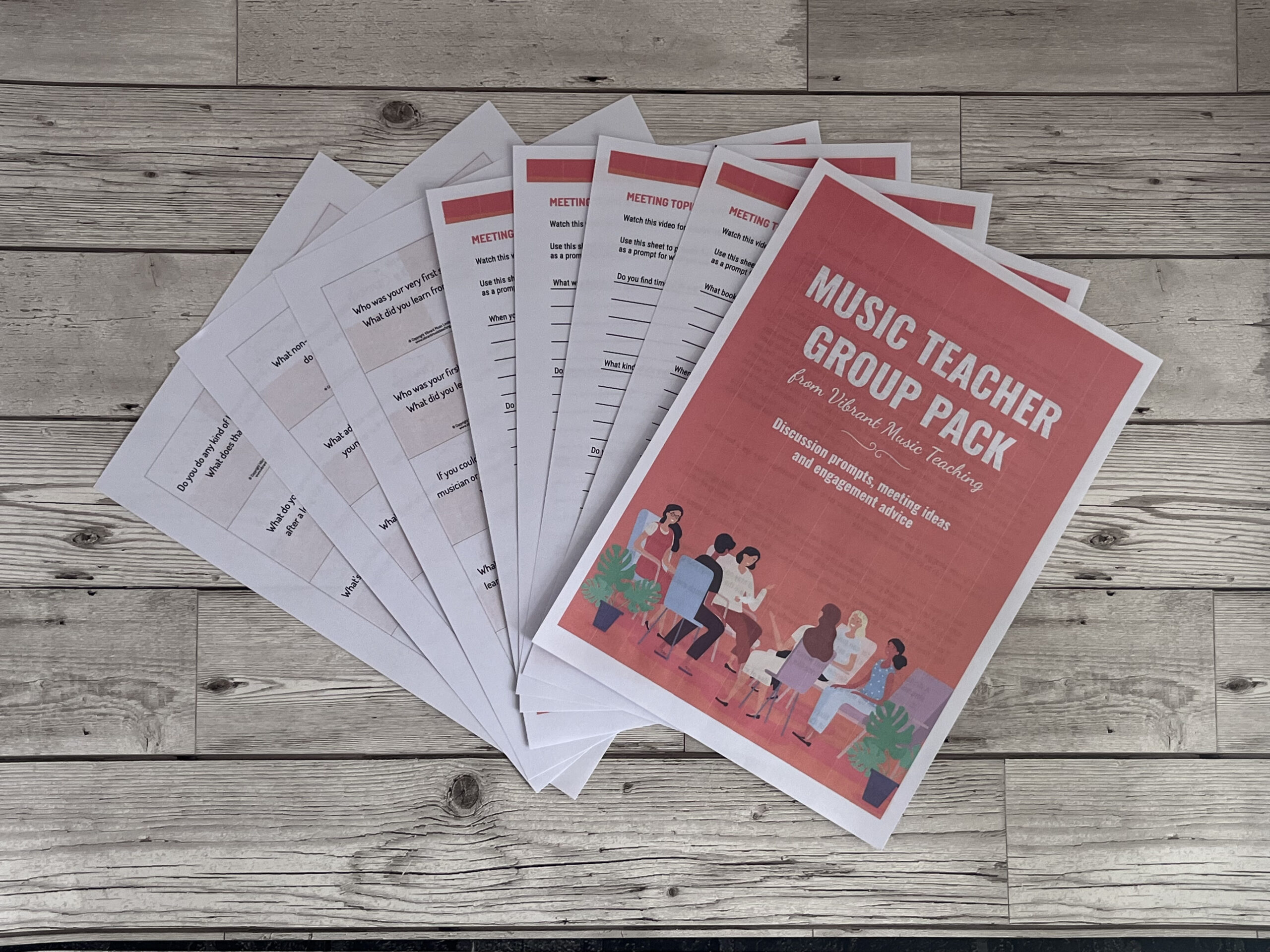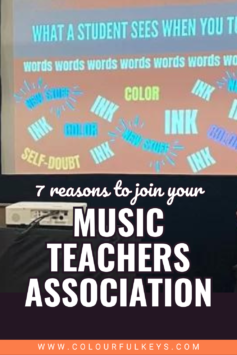
This blog post about the reasons you should join a music teachers association was written by Carmen Carpenter. Carmen has taught music in a school setting as well as in her home studio for over 30 years. Teaching combines two of her favourite things: music and kids! Besides teaching music, Carmen loves spending time with family playing games, working puzzles and watching movies. She’s also an avid reader and loves taking long walks on her local, woodsy trails.
Almost every profession in the world has some kind of membership group associated with it. These groups empower members to become better at their jobs while offering camaraderie and networking opportunities. Music education is no different. We too have professional associations to help us learn, grow and connect with other educators.

Although growth and networking opportunities may sound like a good idea, you might see these as luxuries for a busy educator like yourself.
But let me ask you a few questions:
- Do you have affordable liability insurance for you, yourself, as a teacher? (not just your place of business…)
- Where do you find reliable information about legal issues, such as copyright laws or restrictive covenants?
- When was the last time you felt inspired and motivated by a fantastic presentation designed especially for music teachers who share your passion for teaching technique, theory or Bach inventions?
- Are there enough competition, performance and networking opportunities for your students outside of your studio?
These reasons are just a few indications that it might be time to join a professional association for music teachers like you.
National Associations for Music Teachers
There’s a whole host of reasons to be a part of a national music teacher association. These organisations offer everything from business resources to competitions to pension plans and insurance.
Everyone’s motivations for joining will look different, but here are my top 5.
Benefit 1: Professional Development and Educational Opportunities
It goes without saying that teachers are learners. When it comes to professional development and training, you just can’t beat what a national association has to offer.
Because of the membership size, groups at the national level render a degree of excellence and expertise in all their offerings that no local or regional group can readily match.
At membership-wide conferences, you have your pick of learning opportunities. Whether it’s the latest trends in technology, pedagogy or playing the didgeridoo, these gatherings bring in top-notch presenters and experts in their field.

And you don’t have to go to the national meetings for learning vehicles. Many organisations offer virtual workshops and classes on topics ranging from technique to group class management to marketing your business.
Just imagine doing all that learning from the comfort of your own living room. 🛋️
Nicola’s Studio Business hub page has an entire section about professional development, including how the heck to find the time. Check it out, and boost your teaching creds in the process.
Benefit 2: Business Support Services
If the promise of first-rate professional development doesn’t convince you to join your country’s music teacher association, how about considering the range of support you’ll get from many of these organisations?
Depending on the country you live in, a lot of associations offer services like these:
- Grants or funds for teacher enrichment
- Liability insurance and legal consultation
- Discounts on selected merchant services
- Business-related resources to help you with marketing, writing studio policies, budgeting and so much more
The low-cost liability insurance that I can access is one of the key reasons that led me to join my national music teachers association. Because the membership is so large, these costs are much lower than any policy I could buy on my own.
Benefit 3: Exclusive Publications
You may be thinking of a good ol’ fashioned magazine when I say “publication”. And, yes, the association I belong to does send out a paper magazine.
But the members-only publications available include virtual journals as well as archived presenter materials from past conventions. (In fact, just the other day I was looking at K-pop workshop slides from last year’s meeting. 🕺).
Benefit 4: Marketing
Many national music teacher associations allow you to add your name to their list of teachers so potential students and parents can find you. This “find-a-teacher” database can be especially helpful if you’re new to teaching or have recently moved to a new area.

In addition, your music teacher organisation is likely to have a job bank with lists of vacant jobs in case you would like to find new work or supplement your income. I got a job-posting email from my association just the other day about a full-time teaching position in my area.
(Note: Sometimes this is done at the regional or local level of an association, instead of the national level.)
Benefit 5: Standards and Certifications
Many national music teacher associations offer special certifications.
For example, the Music Teachers National Association (MTNA, in the US) has the ‘Nationally Certified Teacher of Music’ designation. The European Piano Teachers Association (EPTA) offers ‘The Certificate of the Piano Teachers’ Course’ (Cert PTC).
For some students, parents and communities, this kind of title gives them confidence that the teacher they’ve chosen is a top-notch educator who has earned the mandate of a nationally recognized and respected organisation.
Credentials like these could also allow you to charge higher rates.
In addition, certification could be a way to differentiate yourself if there are a lot of teachers in your area.
But maybe you just want to challenge yourself as a teacher by making sure you’re keeping your skills sharp and up-to-date. Working toward a certification would definitely satisfy this aspiration.
Regional and Local Organisations for Music Teachers
Having a national-level membership is great for grand scale advantages like the five mentioned above.
But associations at the regional and local levels are often where you can get into the bits and bobs that could have even more of a day-to-day impact on your teaching life.
Benefit 6: Networking/Peer Connections
I don’t know about you, but I often feel the need for a like-minded person who I can “talk shop” with. (My husband is a great sounding board and all, but he isn’t a musician. His eyes kind of glaze over when I talk about teaching chord progressions or legato technique. 😵💫)
It’s nice to know there’s a group I can regularly connect with that satisfies my need to “speak musician” (or teacher, or studio owner, etc.).

These same folks also serve as mentors and role models for me. When I feel lost or unsure about my teaching or business, I can easily look to my local association members for wise, field-tested advice.
On the flip side, since I do have quite a few years of experience under my belt, I can be a mentor, guide and/or shoulder to cry on for those teachers who haven’t been teaching since dinosaurs roamed the earth (like me 🦕).
Benefit 7: Opportunities for Students
Besides the camaraderie I find in my local music teachers’ group, my students gain perks, too. My own local group puts on 2 festivals each year, along with monthly virtual recitals.
And we’re not alone. Many regional and local associations have similar opportunities for students. In addition to festivals, music groups often offer unique contests and exams.
These events allow students extra growth and performance occasions as well as the chance to see and be inspired by their peers’ performances. Many of my more competitive students get really pumped when they see others play.
Much like their teachers, students get to network by meeting musicians from other studios. In that way, they, too, get to forge connections with peers who share their interest in music.
Popular Associations Around the World
Now that you’ve seen the benefits of joining a music teacher association, you may wonder what group would suit your geographical area.
Here are just a few well-known possibilities:
- Ireland: European Piano Teachers’ Association Ireland (EPTA Ireland)
- UK: European Piano Teachers’ Association UK (EPTA UK)
- USA: Music Teachers National Association (MTNA)
- Australia: Disaggregated by state; more info here
- NZ: Institute of Registered Music Teachers of New Zealand (IRMTNZ)
Alternatives
Maybe you still aren’t sure you want to join a national group, or maybe you don’t have a local/regional chapter in your area. Or what if those options seem intimidating and you’d prefer a smaller group setting?
Get some teacher friends together and start your own group!
VMT has a fantastic resource for just this situation: the ‘Music Teacher Group Pack’. This pack includes all you’ll need to run an effective music teacher group – all except for the donuts and coffee, of course. ☕

SUBSCRIBE TO THE NEWSLETTER AND GET THE MUSIC TEACHER GROUP PACK
Enter your details to subscribe to the newsletter for piano teachers with information, tips and offers; and get access to the composing project.
I hate spam as much as you do! I will only send you emails related directly to piano teaching and you can unsubscribe at any time.
Members of Vibrant Music Teaching can download the pack instantly from the vast Printable Library. Not a member? Learn more and join today at vibrantmusicteaching.com.
But I can’t afford to join!
Can you afford not to?
The membership will pay for itself through the professional development options alone. When you’re a better teacher, you get more students. And more students means more money. (Cha-ching!)
Think of it this way:
Let’s say your annual membership dues are USD $150. If you teach 40 lessons each year to just four students, you’d only have to save $1 from every lesson to cover the dues. (Actually, that’s $160, so you’d have $10 left over to reward yourself for your great decision. 🍹)
To me – and thousands of other music teachers around the world – the benefits far outweigh the yearly costs of membership.

What are your reasons for joining – or not joining – a music teachers association?
We’d love to hear what you think in the comments below.